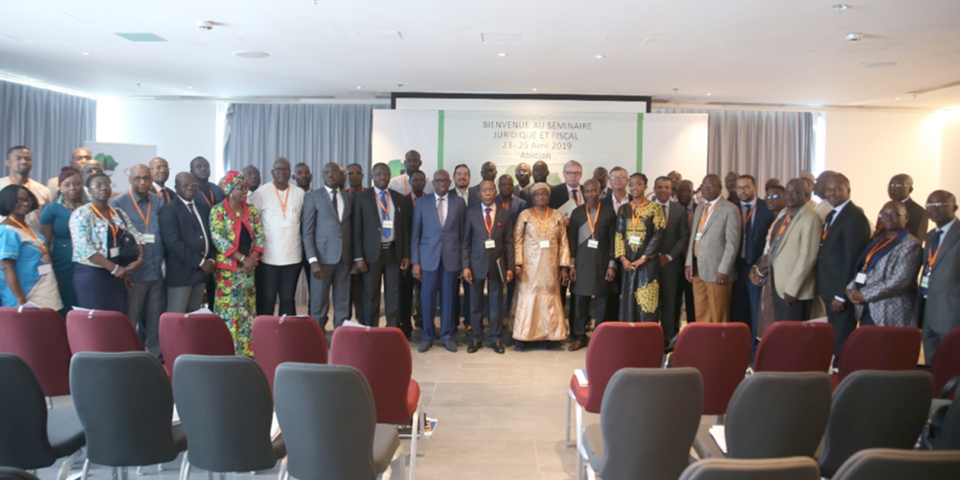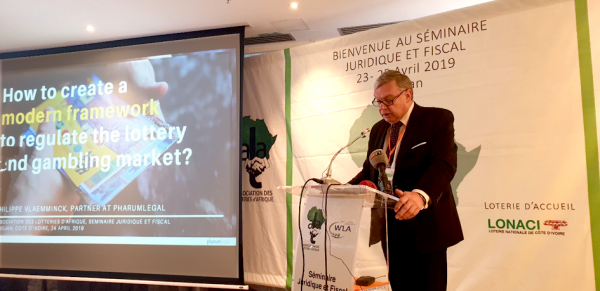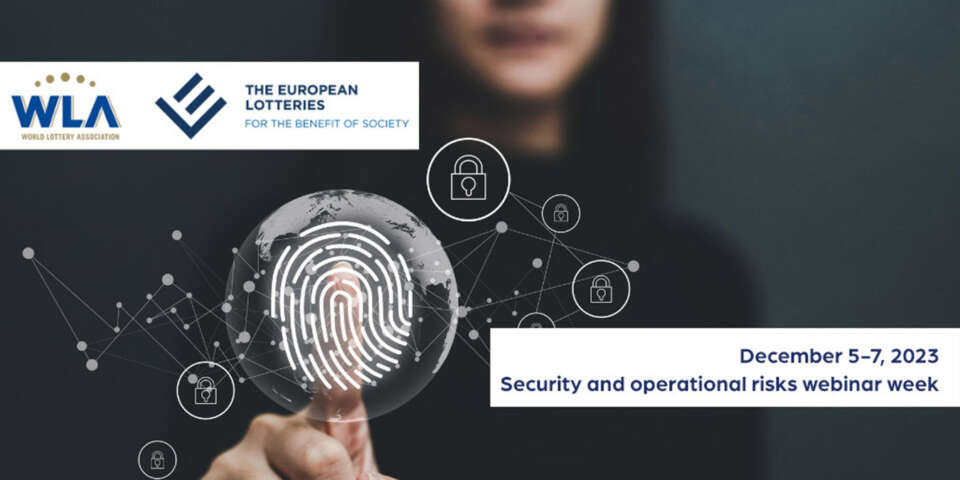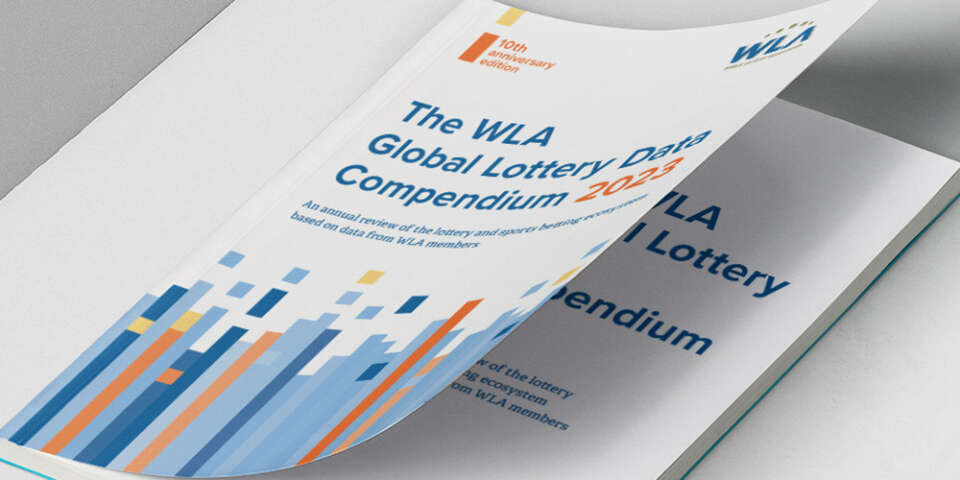Legal and fiscal seminar
April 25-23, 2019
An ALA/WLA event.
Hosted by LONACI
Abidjan, Ivory Coast, Africa
ALA President, Mr. Amadou Samba Kane, Chief Executive Officer of LO.NA.SE (Loterie Nationale Sénégalaise) opened the seminar, welcoming the more then 100 participants from 14 different African nations, France, and Belgium. Mr. Dramane Coulibaly, Chief Executive Officer of host lottery LONACI extended a further warm welcome to the participants.
Following the welcome ceremonies, Philippe Vlaemminck, European Lawyer and renowned expert on gaming regulations, took over the moderation of the two-day seminar. Day one of the seminar centered around regulation best practices. Vlaemminck began with a presentation entitled, “A modern framework to regulate the lottery and gaming market”. In this presentation Vlaemminck posited that the starting point of any good legislative framework is the implementation of total prohibition with explicit exceptions. He warned of the potential risks posed by aggressive online-gaming lobbyists, who guarantee high returns to the government, a promise they can never keep. Vlaemminck also underlined the need to fight illegal gaming operators, including the secondary lotteries, which in many cases violate the sovereignty of the nations in which they operate.
The second presentation entitled "Regulator challenge: fund a lottery" was made be South African lawyer, Dawid Muller. Muller warned of the difficulties of financing a lottery concession, if when following a public bidding, no clarity is provided for the operational license.
Philippe Vlaemminck returned for another two presentations, which covered the impact of competition law. Using anonymous case studies, Vlaemminck showed the risks that lotteries can incur when facing an open market.
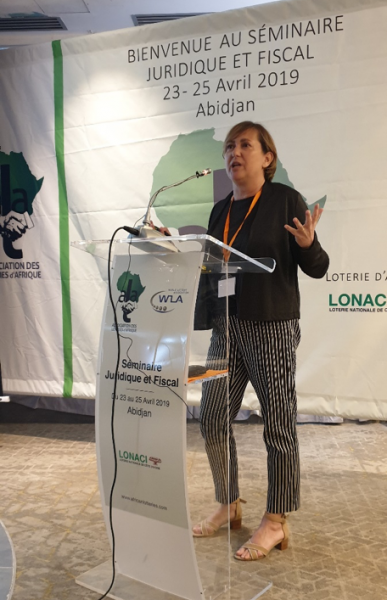
Florence Gras, General Delegate of the European Pari Mutuel Association (EPMA), followed with an overview of the horse race betting sector, and emphasised the need to preserve the integrity of the industry.
Rounding out the morning session, Philippe Vlaemminck returned speaking about the possibilities and complexities of coordinated multi-jurisdictional games.
During the afternoon session, four case studies were presented on the regulation of lotteries and games of chance. The first presentation was made by Peter Naessens, acting General Director of the Belgian Gaming Commission. Naessens spoke on the need for the strict regulation of online gambling and ways to enforce laws against illegal operators. Next followed Souphiane Sankhon, Director of Operation for LONAGUI (Loterie Nationale de Guinée) speaking on the complex structure in Guinea where LONAGUI operates not as a lottery, but rather as regulator overseeing various operators. Dawid Muller then returned speaking on the tensions between the central South African government and its provinces on the licensing of secondary lotteries. The final presentation of the session was made by Roger B. Abim-Karmon, Chief of Office Staff/Administrator to the office of the Director General of the National Lottery of Liberia, Mr. Neved P. Kortu. Abim-Karmon gave an informative presentation on the lottery landscape in Liberia.
The second day of the seminar was reserved for a debate on African taxation models and issues, including questions on VAT, exemptions, and corporate and gaming tax. The morning started with a excellent presentation by Mohamed Lahlou, Chief Financial Officer of MDJS (La Marocaine des Jeux et des Sports). Lahlou pointed out the most important tax issues that need to be considered.
From LONAB (Loterie Nationale Burkinabé) Mr. DA Badé Laurent, Inspector of the General Directorate of Treasury of Public Accounting of Burkina Faso, provided a further overview of the complexity of tax matters that affect the lottery in his country. Mr. Pacôme Mondon, of Mondon Conseil International, followed providing an overview of tax issues in the Ivory Coast. Among other items, he discussed VAT and whether a lottery tickets should be considered as goods or as a service. In response moderator Vlaemminck referred to the 1994 Schindler case before the European Court of Justice who ruled that a lottery ticket was a service of a particular nature. He also mentioned the problem of state aid when it comes to exemptions, a matter that is of equal concern in the two African economic communities, UEMOA and COMESA. Mr. Raphaël Jean-Louis Nougbode, Director of Audit and Internal control for LNB (Loterie Nationale du Bénin) gave a presentation on the legal structure in Benin and how it affects the lottery. Concluding the discussion, Mr. El Hadji Ibrahim Diop, independent expert and former director of legislation of the Senegalese Tax Department, extensively outlined the various tax issues that should be seriously considered and the need for comprehensive governance.
The session was closed with another in-depth question and answer session. Both ALA President, Mr. Amadou Samba Kane, and Driss Hamdoune Secretary-General of MDJS – who represented ALA Secretary General, Younes EL Mechrafi – emphasized the need of ALA set up a committee on legal and fiscal matters.
Moderator Philippe Vlaemminck closed the seminar by summing up the main issues that were addressed over the two days, expressing his optimism for the future of the African lotteries and the support that ALA provides them. He called the seminar “memorable experience” owing to its excellent organization, its strong content, and the very active participation of the large audience. Many thanks to go out to the LONACI and ALA teams for their tremendous work and organization of this this highly successful event.
